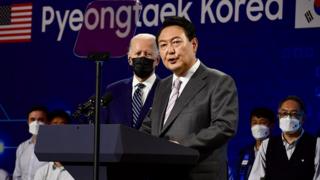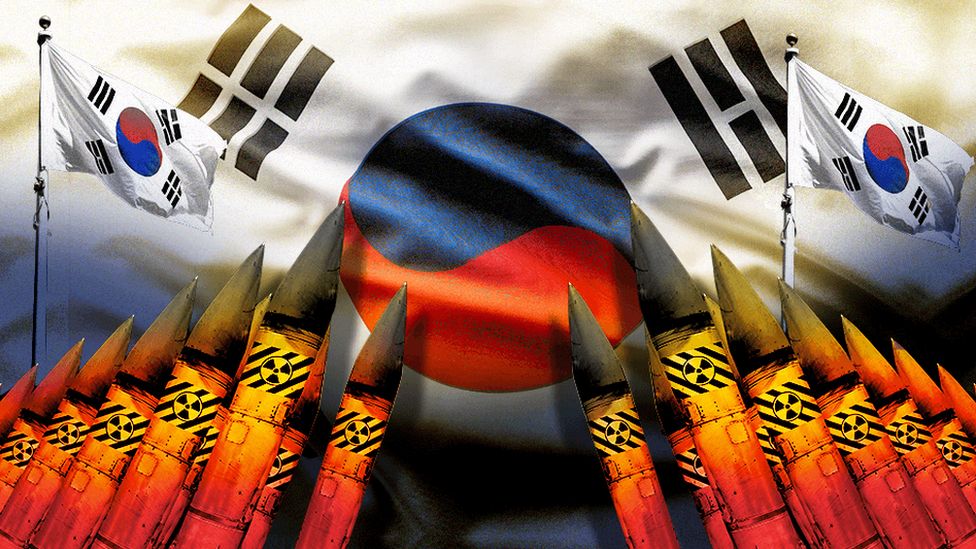
Hidden away in the private room of an underground restaurant in Seoul, a disparate group of South Koreans have gathered for a clandestine lunch. Among the mix are politicians, scientists, and military people, some of whose identities are too sensitive to reveal. This is the inaugural meeting of the Nuclear Policy Forum, and their lunchtime agenda is ambitious – to plot out how South Korea can develop nuclear weapons.
This once-fringe idea has exploded into the mainstream over the past months. Even South Korean President Yoon Suk-yeol raised the possibility during a defence meeting, making him the only president to have put this option on the table in recent times. Now newspaper columns trumpet the idea daily, while a staggering three-quarters of the public support it. South Koreans have grown anxious about their nuclear-armed neighbour to the north, and on Wednesday Mr Yoon is heading to the White House, seeking President Joe Biden’s help.
South Korea previously flirted with the idea of developing nuclear weapons in the 1970s, when it ran a secret programme. But when the United States found out, it issued an ultimatum: Seoul could carry on, or have the US defend it, with the full force of its existing nuclear arsenal. It picked US support, and to this day tens of thousands of US troops remain stationed on the Korean peninsula.
Since then, the geopolitical situation has shifted dramatically. North Korea is building ever-more sophisticated nuclear weapons that can target cities across the US, leaving people to question whether Washington would still come to South Korea’s defence.
Here is the scenario they chew over: a belligerent Kim Jong-un attacks South Korea, forcing the US to intervene. Mr Kim then threatens to detonate a nuclear bomb over the US mainland unless it withdraws from the war. What does Washington do? Does it risk having San Francisco reduced to rubble to save Seoul? Probably not, is the conclusion those at the secret lunchtime meeting have come to.
“It is irrational to think another country should protect us. This is our problem and our responsibility,” said Choi Ji-young, a forum member and member of South Korea’s ruling People Power Party.
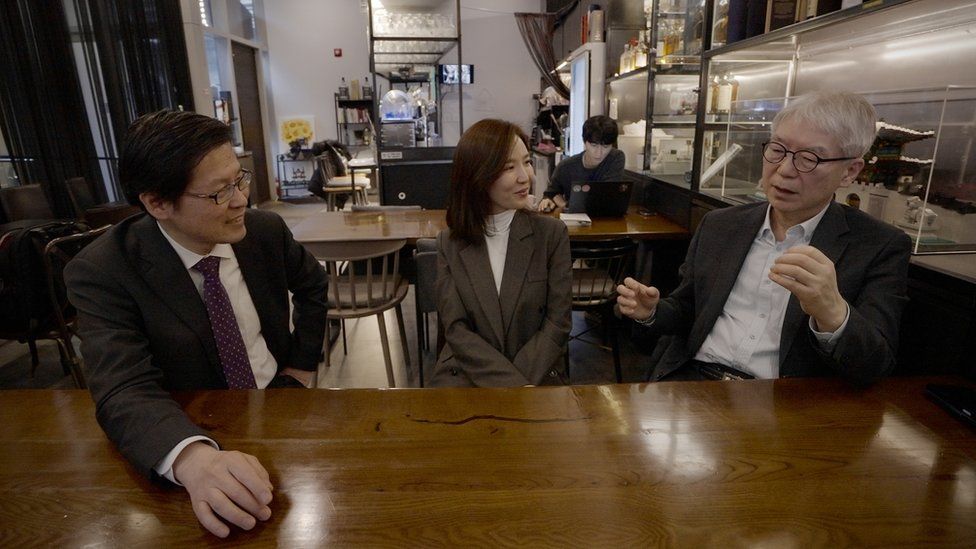
The chairman of the forum, academic Cheong Seong-chang, presented their suggested plan. The next time the North tests a nuclear weapon, Seoul would withdraw from the Treaty on the Non-Proliferation of Nuclear Weapons (NPT). If, within six months, Mr Kim has not agreed to give up his weapons, Seoul would start building its own. Mr Cheong argues that this would reduce the probability of a nuclear war on the Korean peninsula, as Mr Kim would be less likely to attack, knowing the South could strike back.
But Jenny Town, from the US-based think tank 38 North, challenges the assumption that a nuclear-armed South would make the North less adventurous. “More nuclear weapons does not make the world safer from nuclear use,” she said. “If you look at India and Pakistan as an example, this is not what we have seen. If anything, being nuclear-armed has sort of given them both the green light to go a little further.”
A nuclear-armed South Korea is absolutely not what Washington wants. Yet, this beast is partly of America’s making. In 2016, then-President Donald Trump accused South Korea of free-riding. He threatened to make Seoul pay for the US troops stationed on its soil, or else he would withdraw them. The fear those words instilled in people has not lessened with time. An increasing number of South Koreans, acutely aware that America’s promises are only as good as its next leader, now favour building the bomb.
On a recent Sunday afternoon, at a local sauna in Seoul, people young and old from all backgrounds gathered to ease their weekly aches, while indulging in beer and fried chicken. While it might seem strange to discuss nuclear proliferation in such a setting, these days, it is almost in the realm of small talk.
“The US is not going to use its nukes to defend us, so we should be in control of our own defence,” said 31-year-old Koo Sung-wook, who swayed this way during his time in the military. He served in 2010, during a major crisis when North Korea shelled a South Korean island, killing four people.
“It felt like a total emergency. Units were calling their parents and writing wills,” he recounted. Now he worries not just about North Korea, but China too. “We are surrounded by these great powers and walking on eggshells around them. To be competitive, we need to have nukes.”
Almost everyone at the sauna agreed, even 82-year-old Hong In-su. A child during the Korean War in the 1950s, she said she was anti-nuclear weapons, before reluctantly concluding they were a necessary evil: “Other countries are developing theirs, so I don’t see how we can go on without them. The world is changing.”
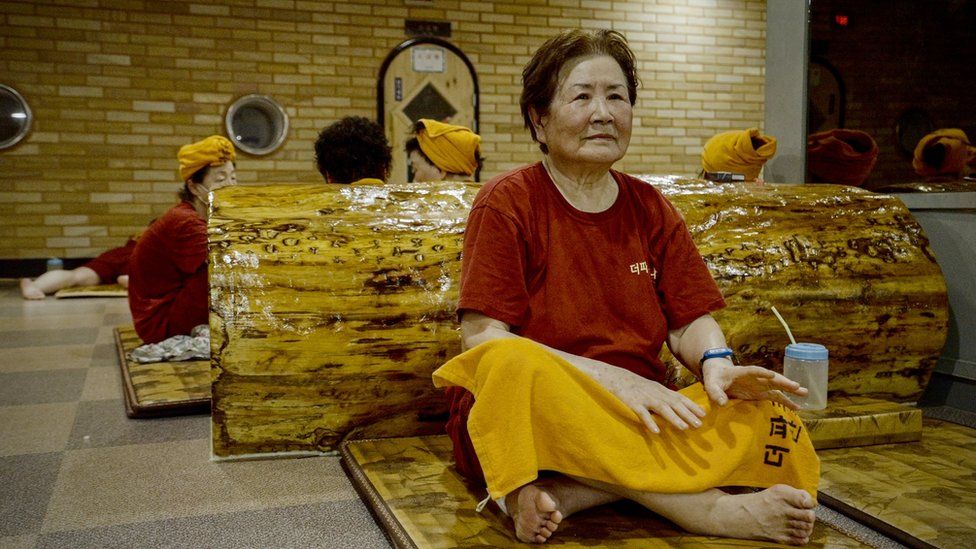
Another woman was torn over whether the US would defend South Korea, and thought it “better to have nukes just in case”, while a young mother worried that Seoul’s current relationship with the US could change at any moment.
Washington is now scrambling to reassure its ally of its “iron-clad” commitment to its defence. Earlier this month it stationed a gigantic nuclear-powered aircraft carrier in the southern port of Busan. But to the frustration of US policymakers, such reassuring gestures no longer seem to be working.
Seoul’s politicians have grown wary of being kept in the dark, unclear about what would trigger the US president to push the nuclear button on their behalf. Currently, there is no requirement for Mr Biden to even tell Mr Yoon before doing so. “At the very least we could build in a mandatory phone call, so long as it is understood that this is still the US president’s decision,” Ms Town said.
Yang Uk, a defence analyst with the Seoul-based Asan Institute, was in the room with President Yoon when he made his remarks about South Korea going nuclear. He claims Mr Yoon was indirectly pressuring the US. “The US is so reluctant to discuss its nuclear policy with South Korea and yet if a nuclear war broke out on the peninsula we are the ones who would suffer the most,” he said.
Seoul is pushing to be more involved in the planning and execution around nuclear use. That could mean having US nuclear weapons stationed in South Korea, or to have a nuclear sharing arrangement, similar to that in Europe, where South Korea is able to use US weapons in the event of a war. A less drastic option would be to create a joint nuclear-planning group.
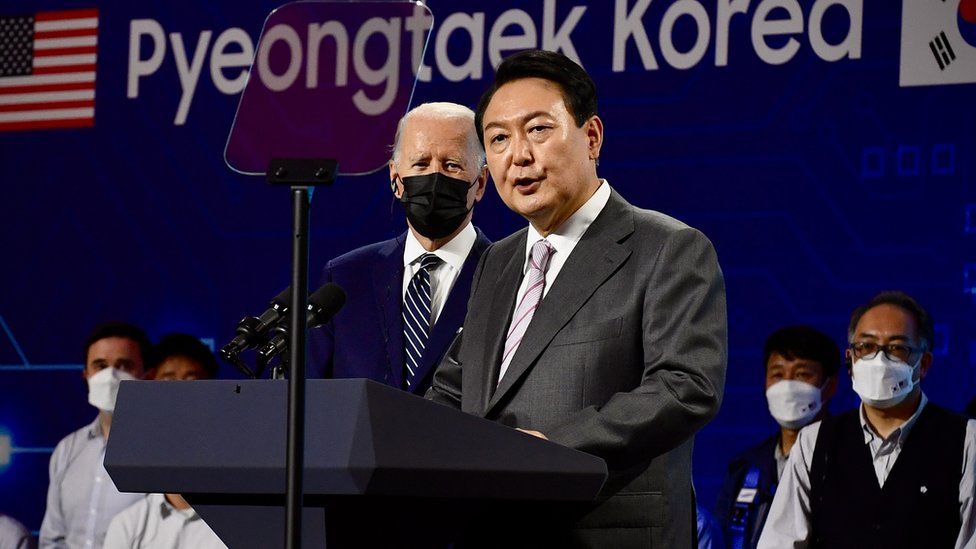
The US is unlikely to offer up much, but knows it must deliver something concrete that President Yoon can chalk up as a win, and sell to the South Korean public. Even so, it may prove too late. This once inconceivable idea is now so firmly planted in the South Korean psyche, it is difficult to see how it can be uprooted.
Going nuclear is a mammoth decision. The current international order is built on the non-proliferation of nuclear weapons, and those that threaten this order, such as Iran and North Korea, have paid a high price. Analysts say the South Korean public has probably not considered the consequences. The US could pull out of its defence commitment, China might retaliate ferociously by hounding South Korea with sanctions, and their country could end up isolated, another failed pariah state, its dazzling international reputation in tatters.
At the sauna, people seemed unperturbed by these scenarios. Only one woman conceded that if it meant South Korea becoming “an axis of evil” then it was probably not worth it.
But that is unlikely to happen. South Korea is too strategically and economically important for it to be shunned like North Korea. Most analysts do not even believe the US would end its decades-long military alliance. Instead, the concern is that a potential South Korean nuclear armament would create such a crack in the non-proliferation regime, it would cause other countries to follow.
Only 82-year-old Hong In-su seemed to grapple with the dangers ahead. She quoted a Korean proverb that roughly translates to “you fall in your own poop”, or in other words, this could seriously backfire.
“I do think nuclear weapons will come back to harm us,” she said. “I feel bad for the next generation.”

Read more of our coverage from North and South Korea


